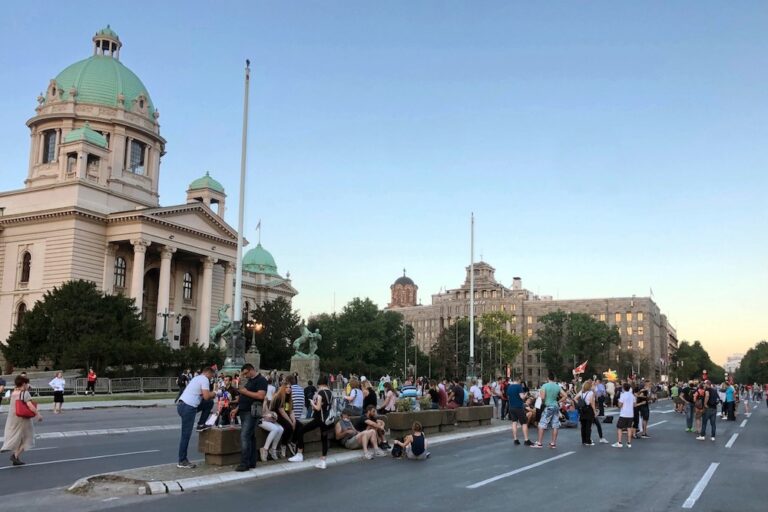(ARTICLE 19/IFEX) – The following is an ARTICLE 19 press release: For immediate release 25 June 1999 LAWS MUST CHANGE TO END CENSORSHIP IN SERBIA, SAYS ARTICLE 19 “The international rights group today called for the repeal of the noxious Serbian Public Information Law, which otherwise ensures that censorship continues, despite lifting of the state […]
(ARTICLE 19/IFEX) – The following is an ARTICLE 19 press release:
For immediate release
25 June 1999
LAWS MUST CHANGE TO END CENSORSHIP IN SERBIA, SAYS ARTICLE 19
“The international rights group today called for the repeal of the noxious
Serbian Public Information Law, which otherwise ensures that censorship
continues, despite lifting of the state of war. Introduced in October 1998,
and implemented particularly vigorously during the Rambouillet negotations,
the Law remains in place, effectively shutting out any non-governmental
opinion.”
The October law was used by the Milosevic regime months before the war to
ban rebroadcast of foreign radio programmes, shut down critical publications
and broadcasters and jail journalists.
According to Andrew Puddephatt, Executive Director of ARTICLE 19:
“The Serbian authorities had consolidated their control over the media
during the year before the war – martial law censorship made little
difference. This allowed them to conceal information on worsening human
rights abuses by the military in Kosovo, play down dissenting views and
prevent open debate on their policies.”
ARTICLE 19 today demanded that the international community support the
independent media in Yugoslavia as the key to developing and sustaining
democracy in the country and to establishing a longterm solution to the
Kosovo dilemma.
“Until such a framework has been established, elections are unlikely to
change the balance of power in Serbia. In the absence of a free media,
mooted elections would be far from fair,” warned Andrew Puddephatt.
ARTICLE 19 also expressed concern at reports that the Serbian government
intends to entrench certain military decrees in law.
For more information contact Fiona Harrison at +44 207 278 9292
1. In early October, the ‘Decree on Special Measures in Circumstances of
NATO’s Threats with Military Attacks Against Our Country’ was used to close
newspapers Danas, Dnevni Telegraf and Nasa Borba. The decree allowed
newspapers to be banned and their equipment seized if they were deemed to be
fomenting “fear”, “panic” or “defeatism” in the face of threatened military
action by NATO.
2. The Public Information Law incorporated some provisions from the Decree
and contravenes international law, as well as Serbia’s own Constitution. It
was introduced on 20 October shortly after the Serbian Information Minister,
Aleksandar Vucic sent an ominous warning note to many independent
broadcasters.


